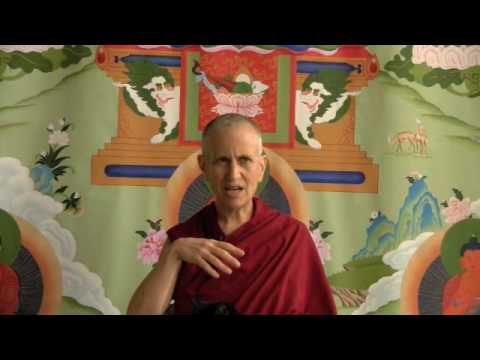Six root afflictions: Conceit and humility
Stages of the Path #105: The Second Noble Truth
Part of a series of Bodhisattva's Breakfast Corner talks on the Stages of the Path (or Lamrim) as described in the Guru Puja text by Panchen Lama I Lobsang Chokyi Gyaltsen.
We’re going to talk a little bit more about conceit; there are two more kinds that we need to talk about.
Conceit of mistaken qualities
One is the conceit of having good qualities that we, in fact, don’t have. Do you know that one? The thing that’s actually tricky about this one is we often don’t know that we have it because we think that we do have those good qualities. It’s the conceit of thinking, “I have this and such quality. I’m so good at this. I’m so knowledgeable about this. I’m so well-respected on blah-blah-blah . . . ” when in fact, that isn’t the case. However, we’re so distorted in our way of viewing things that we think we actually do have all those qualities. “We’re so expert. We’re so acute. We’re so talented. We really know what’s best. Nobody can tell me what to do because they know I’m an expert in this field.” Right? That’s what is hard about seeing this kind of conceit, detecting it, because we really do think we are that good.
Conceit of non virtues seeming virtuous
Then another kind of conceit is the conceit of thinking that our non virtues are virtues. We do this all the time, too. “I lied, and I got myself out of that such-and-such. I didn’t get a traffic ticket. I didn’t get fined for this-and-that. I didn’t have to pay taxes. Isn’t that good what I did?” Or, “I told that guy off. I put him in his place. I let him know who’s in charge here.” Or, “I got this in such a good condition.” We think it’s good that we did that. Or, “I went around. I slept with this person, that person. I’m a big lover. Look at me.” It’s thinking it’s all very virtuous.
You can go through each of the ten non virtues and see how we can very easily, in our deluded way of thinking, think that doing these non virtuous actions is actually good and that we’re very special because we do them. We fool people or we get different advantages for ourselves.
These two things are very similar: the conceit of being proud of our non virtuous actions and then also the conceit of thinking that we have good qualities that we don’t. In both of those situations, we don’t even realize that we’re way off base. In both of those situations we truly believe, “I have these qualities,” and “What I’m doing is great.” So, you see how it’s not only this conceit, but it also goes into wrong views as well. Then that just encourages us to do more of the above, never even realizing that what we’re doing is damaging to ourselves.
Introspective awareness is required
We need a lot of introspective awareness to notice when any of these kinds of conceit are manifesting. Then we need to be mindful of being humble. Being humble is not a false humility. It’s not pretending to be low while you’re really thinking you’re good. It’s not like that. It’s more just realizing that we can be humble and still acknowledge that we have good qualities.
Humility doesn’t mean that we don’t see our good qualities. We acknowledge our good qualities, but we aren’t conceited about them because we know that any good qualities we have is because other people taught us and other people encouraged us. It wasn’t like we were born with those abilities and could do them right off the bat. We depended on other people to teach and to encourage. So, when we have that kind of take on our good qualities then we can still recognize them, but we’re not conceited.
Gratitude to others
When we bring compassion into it, we say, “Wow, I’m so fortunate to have these qualities,” but not in a conceited way. It’s not, “I’m so fortunate” going into conceit, but rather, “I have these abilities due the kindness of others and due to karma, so I have a responsibility to share my talents, abilities, and knowledge with other people. If I don’t do that, then that is something that is completely opposite to my bodhisattva training.”
That’s how to work with these different kinds of conceit and arrogance. But they can be really hard to recognize, can’t they?
Venerable Thubten Chodron
Venerable Chodron emphasizes the practical application of Buddha’s teachings in our daily lives and is especially skilled at explaining them in ways easily understood and practiced by Westerners. She is well known for her warm, humorous, and lucid teachings. She was ordained as a Buddhist nun in 1977 by Kyabje Ling Rinpoche in Dharamsala, India, and in 1986 she received bhikshuni (full) ordination in Taiwan. Read her full bio.


